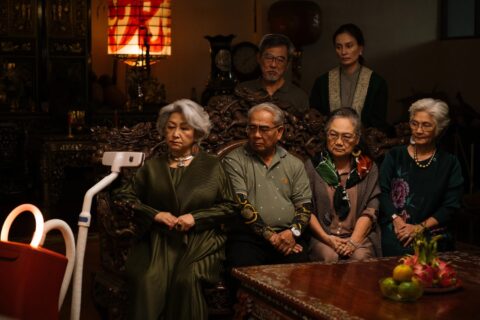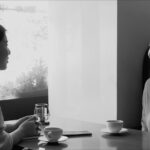“Please stop screwing your vacuum.”
Everyone from the British Isles knows about Henry hoovers. For those not from our sceptred isle, they are basically vacuum cleaners with a cute, childlike face printed on them. The design is iconic — giving personality to a machine that is mostly a source of annoyance and anxiety.
I thought of this playfulness constantly throughout A Useful Ghost (2025), Ratchapoom Boonbunchachoke’s debut feature, which is delightfully filled with haunted hoovers, using its seemingly absurd premise to create a thoughtful reverie on love, memory, discrimination and assimilation. As accessible as it is silly, as deep as it is amusing, this queer slice of magic realism is certain to be one of the breakout hits at this year’s Cannes Film Festival.
We start with self-described Academic Ladyboy (Wisarut Homhuan). He has no idea that the appearance of dust in his flat is going to transform his life forever. Naturally, he purchases a new vacuum cleaner, only to find that it makes odd noises at night. He calls a mechanic. The handsome Krong (Wanlop Rungkumjad) turns up and explains that his machine is actually haunted. It turns out that people are dying in factories and their spirits occupy these previously inanimate objects, giving capitalists a headache and society at large a myriad of bureaucratic issues.
Krong and Ladyboy continue to talk throughout the film as the central attention turns upon factory owner Suman (Apasiri Nitibhon), who must deal with the death of worker Tok (Krittin Thongmai) and his relentless pursuit of justice as a ghost, occupying all different manner of factory equipment. Matters are further complicated when her son March’s (Witsarut Himmarat) dead wife Nat (Davika Hoorne) comes back to life as a hoover, prompting all sorts of reactions from Suman’s wider family and business associates. Soon, Nat — who is, for all intents and purposes, a vacuum cleaner — has to find a way to prove herself as still worthy of March’s love.
It’s hard not to read Nat’s journey — and interaction with Tok — as anything other than an allegory for the difficulties of assimilation. And while the central love story is not queer by itself, the existence of three queer couples in the supporting cast make it abduntantly clear that Boonbunchachoke is interested in the insane compromises that LGBTQI+ must make to fit into heterosexual society.
This particular Thai mixture of seriousness and absurdity is what makes A Useful Ghost so good. Both wistful comedy and deep sadness spring from this same deadpan visual style — lots of static frames; gorgeous golden ratio lensing; expert use of soft film stock; immaculate mise-en-scène that understands how to use medium distance shots to heighten a sense of absurdity; and superbly rendered shot-reverse-shots. Particularly accomplished is Apasiri Nitibhon, whose line readings (including the above epitaph) and sad expressions somehow evoke comedy even while the situation gets increasingly more pitiful. Even as one of the film’s ostensible “villains,” she never feels like a caricature.
Running well over two hours, the leisurely runtime allows for numerous detours and digressions, but what’s most remarkable is how tightly-plotted the entire thing is, culminating in a richly satisfying and pointedly political conclusion. We ignore ghosts at our peril, even if they look like funny little hoovers.
Redmond is the editor-in-chief of Journey Into Cinema.





